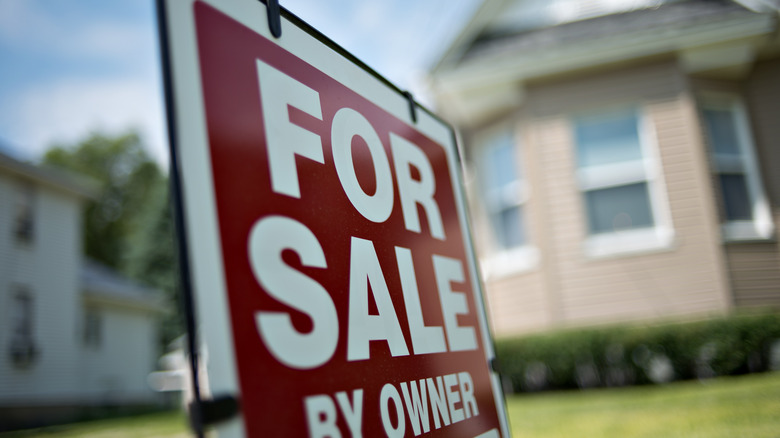The Upsides And Downsides Of Owner Financing When Buying A House
Owner financing, also called seller financing, refers to a situation when the homeowner takes an active role in the buyer's financing, according to Pine Financial Group. No banks are involved, unlike traditional loans, which means there is far less paperwork. In this situation, the seller owns the property free and clear with no liens attached. When the decision is made to sell the home, the owner carries the loan, while the buyers combine it with a new bank loan, or they make the down payment (if they have enough money saved up) and monthly payments on their own.
Basically, the idea presents some possible win-wins for both the buyer and the seller. The buyer won't have to go through the long process of applying with a traditional bank and waiting on approval or produce as many documents, such as a proof of income unless the seller requests that information. The sellers, in turn, receive a quick sale on their property without having to hire a real estate agent or an appraiser. However, just like any other alternative to the traditional mortgage, owner financing has its pros and cons.
How does owner financing work?
Owner financing works in a similar manner as a conventional loan where the buyer gives a down payment while making monthly payments on the balance as noted, per Forbes. Often, sellers require a background or credit check, but that's not always the case, which allows buyers, who may not qualify for a traditional loan, to still buy a home. Once the two parties come to an agreement on the terms, the buyer will make payments for a period of time and will be responsible for paying insurance premiums and property taxes to the respective parties.
On the other hand, the seller can choose to work with an escrow service that accepts payments toward the principal, interest, insurance, and taxes and disperses the funds to the rightful parties. Depending on the structure of the deal, the buyer might also have to pay a sizable sum at the end of the term or refinance the mortgage. Throughout the owner-financing process, no inspections or appraisals are required unless the seller makes the request.
The advantages and disadvantages of owner financing
Although the "middleman" is taken out of the equation, homebuyers still have to face both pros and cons when it comes to purchasing a home through owner financing, as Investopedia explains. Starting with the perks, this alternative to traditional home financing might give borrowers access to financing that they may otherwise not be eligible for. Furthermore, this route allows buyers and sellers to speed up the due diligence process for a faster closing. Plus, owner financing reduces closing expenses by eliminating the need for appraisals, bank fees, and if the buyer so desires, inspection fees. Another advantage is the fact that owner-financed mortgages don't affect your credit score.
Consequently, you may also have to contend with the downside to owner financing, depending on the terms the seller sets out. For example, when compared to a standard mortgage, you may face higher interest rates and a shorter period for paying off the mortgage, which could result in a balloon payment at the end of the loan's term. Or you may have to deal with a due-on-sale clause, which means you'll have to pay off the mortgage if you decide to sell the house before the term is up. Finally, you can also face the possibility that a seller is not open to an owner-financing situation, particularly if you haven't provided them with a copy of your credit history, which is risky for you, or if they aren't comfortable with working out the deal on their own without the aid of a broker or loan officer.
How safe is owner financing?
When buyers and sellers try to safeguard their financial interests, owner financing offers a prudent way of funding the mortgage and facilitating a sale in an ethical manner. For starters, the details of the financing should be outlined in a formal agreement in the form of a real estate contract or a lease-purchase agreement that's prepared by a certified paralegal or an attorney. Or, if you prepare one on your own, you should have it reviewed by an attorney just to be safe.
Moreover, because seller financing removes the requirement for a lender-mandated appraisal and inspection, homebuyers should take precautions to ensure the price isn't excessive, and the property doesn't have any major issues. Similarly, sellers are not required to do a background check on a buyer prior to agreeing to fund the transaction. However, as noted by Forbes, it is a good idea to mitigate the risks of owner financing while also increasing the chances of a buyer completing on-time payments.
How do you find owner-financed homes?
You might wonder where to locate owner-financed homes, assuming you don't qualify for a mortgage. Here are several possibilities, as outlined by Investopedia and SFGATE. For starters, websites dedicated to real estate. Most real estate aggregator websites allow you to search by keyword, such as "owner financing." You may also search the internet for queries like "owner-financed properties near me" to uncover businesses which link buyers and sellers. Local agents and brokers may be aware of unpublicized deals in the local area as well. Also, look through the FSBO listings where you'll find some prospects. If a property strikes your interest, contact the seller and inquire about owner financing.
Additionally, you can peruse through the available rental listings. Inquire from the owner if they're willing to sell with financing if you notice a home you like that's for rent. You might be in luck and locate someone who is tired of managing their property but still needs a steady source of income on a monthly basis.




